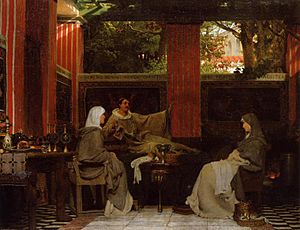Venantius Fortunatus facts for kids
Quick facts for kids Saint Venantius Fortunatus |
|
|---|---|

Venantius Fortunatus Reading His Poems to Radegonda VI by Lawrence Alma-Tadema (1862).
|
|
| Bishop of Poitiers, Church Father | |
| Born | c. 530 AD Venetia, Kingdom of the Ostrogoths |
| Died | c. 600 or 609 AD Pictavium, Kingdom of the Franks |
| Venerated in | Roman Catholic Church Eastern Orthodox Church |
| Feast | 14 December |
Venantius Fortunatus was an important Latin poet and hymnographer (someone who writes hymns) who lived a long time ago. He was also a bishop in the early Christian Church. People have respected him as a saint for many centuries. He was born around 530 AD and died around 600 or 609 AD.
Contents
Life of Venantius Fortunatus
Venantius Fortunatus was born in a place called Duplavis, near Treviso in Italy. This was during a time when the Roman Empire was trying to take back parts of Italy. When he was a young man, in the 550s or 560s, he went to Ravenna to study. There, he received a great education, learning about famous Roman poets like Virgil and Ovid. He also studied Christian poets. He probably knew some Greek too!
Around 566 AD, Fortunatus moved to Metz, which is now in France. He wanted to become a poet for the Merovingian kings and queens. His journey to Metz was long, going through four modern countries. He said he traveled to visit holy places, especially the shrine of St. Martin in Tours.
When he arrived in Metz, he wrote a special poem for the wedding of King Sigibert and Queen Brunhild. This made him very popular! Many important people, including kings and bishops, asked him to write poems for them. He became good friends with Queen Radegund and Gregory of Tours, who was a bishop. He wrote many poems for Radegund and even defended Gregory when he was accused of treason.
Later in his life, around 576 AD, Fortunatus became a priest. He stayed in Poitiers for a long time. Around 599 or 600 AD, he was chosen to be the Bishop of Poitiers. He died in the early 7th century. Even though he was never officially made a saint, people started calling him one after he died.
Works and Writings
Venantius Fortunatus is most famous for two hymns that are still sung in churches today. One is called Pange lingua gloriosi proelium certaminis, which means "Sing, O tongue, of the glorious struggle." The other is Vexilla Regis prodeunt, meaning "The royal banners forward go." This hymn was written to honor a piece of the True Cross (the cross Jesus was crucified on), which was sent to Queen Radegund.
Fortunatus wrote eleven books of poetry! His poems covered many different topics. He wrote epitaphs (poems for tombs), panegyrics (poems praising someone), and religious poems. He wrote four major panegyrics for Merovingian kings and queens, like King Sigibert and Queen Brunhild. These poems were often very fancy and made the kings seem very powerful and good. Sometimes, he used his poems to gently suggest how a king should rule, even if the king was not acting ideally.
His collection of poems helps us learn a lot about his life and the people he knew. He also wrote a long poem about the life of Saint Martin, which was like an ancient epic story but with Christian themes. He also wrote a hagiography (a biography of a saint) about his friend, Queen Radegund.
Impact and Contributions
During his time, Fortunatus was a very important poet. Kings, bishops, and nobles hired him to write poems. He used his writing to become more successful, to support political ideas, and to share his thoughts. He was very skilled with words. Because he supported the church and the royal families, he remained popular throughout his life.
Today, Fortunatus's writings give us a special look into the world of the Merovingian court. His poems sometimes show a different side of events compared to other historical writings from that time. He helps us understand the culture and politics of that period. Some of his hymns have even been set to music by famous composers.
Feast Day
Saint Venantius Fortunatus is remembered as a saint in the Roman Catholic Church. His feast day is celebrated on December 14th each year.
Images for kids
See also
 In Spanish: Venancio Fortunato para niños
In Spanish: Venancio Fortunato para niños
 | Georgia Louise Harris Brown |
 | Julian Abele |
 | Norma Merrick Sklarek |
 | William Sidney Pittman |


